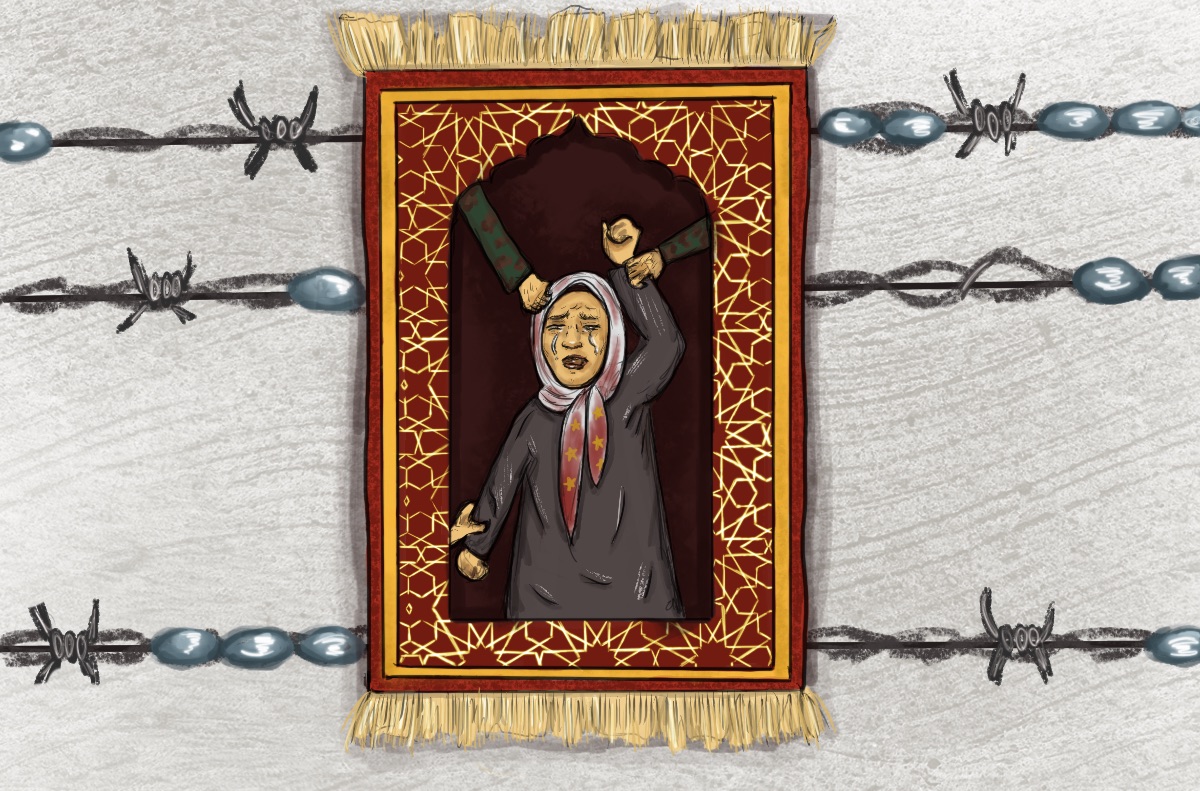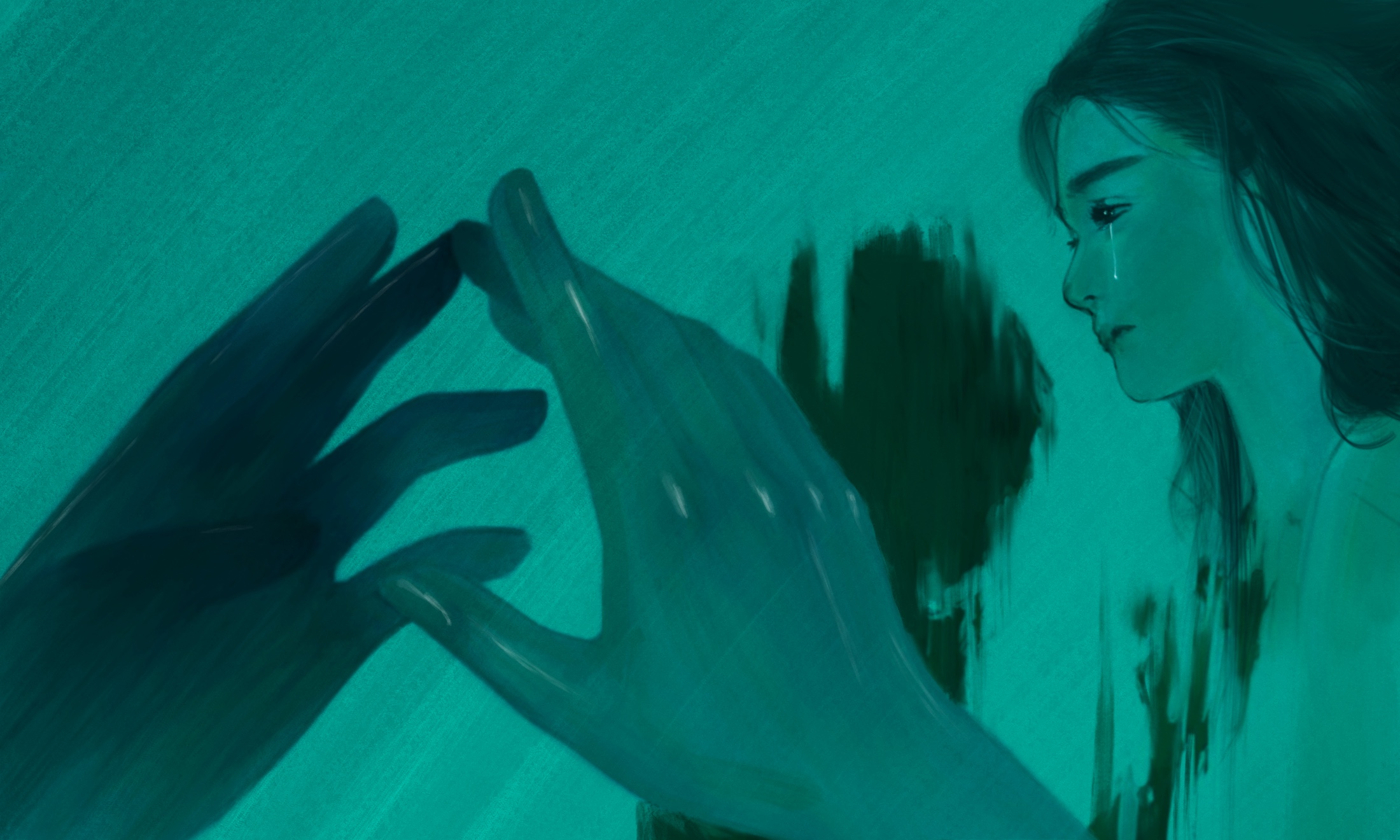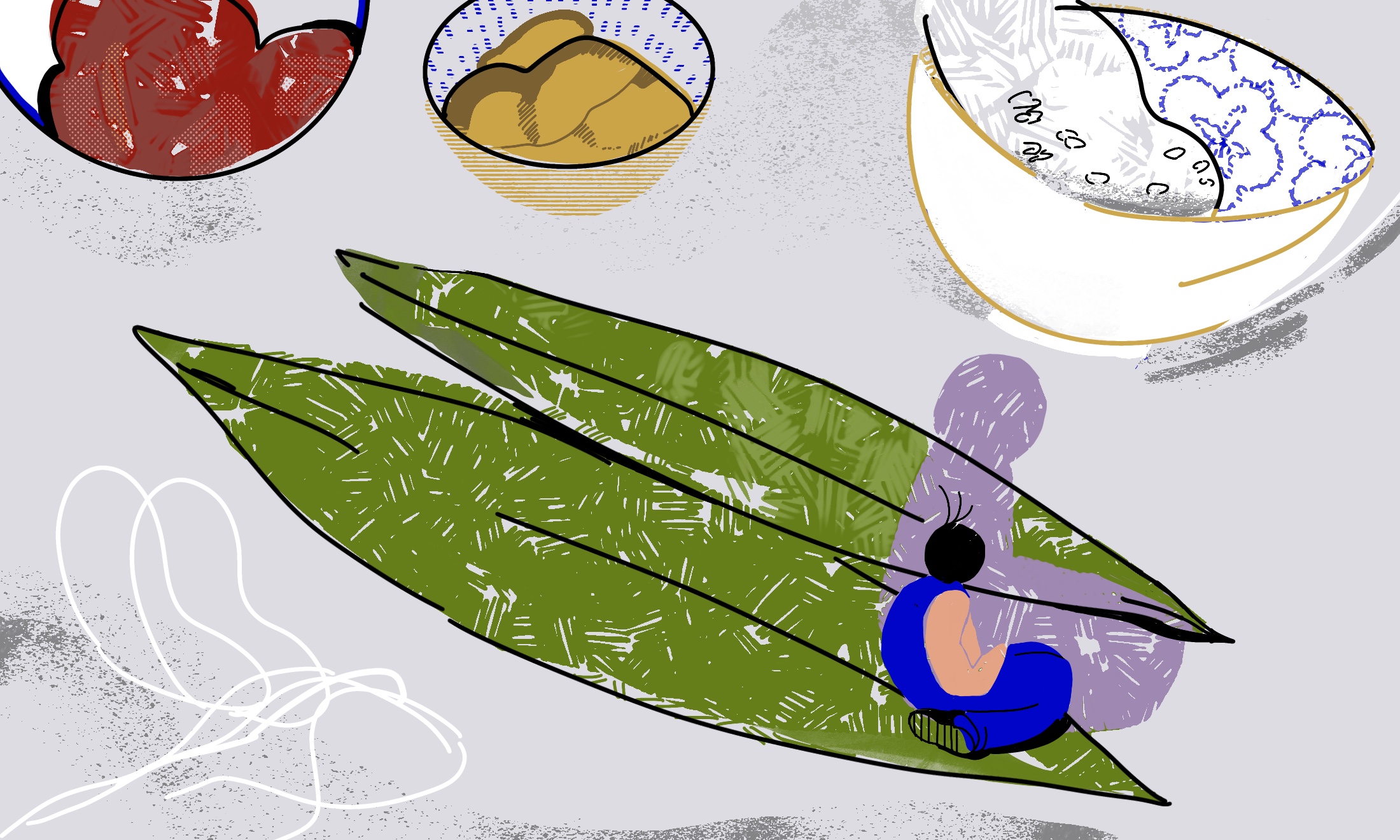
One belt, one road, one million prisoners: China’s secret war on Muslims along the ‘Silk Road’
Sahar Shah
08 Oct 2018
image by Khadija Said
In March last year, a local radio employee received a phone call from his district’s police station, asking him to report to a “re-education camp” in Xinjiang. “The reason why I was caught is because I went to Egypt to study Islam in 2007,” he tells gal-dem over a WhatsApp call. He is too afraid to use his real name or Facebook.
Fuelled by the belief that the Uyghur people, a Muslim minority in the area, may form a resistance and make attempts to create a separate state, the Communist Party of China is in the midst of a crackdown on the Muslim minorities in the Xinjiang region. Intimidation and forced assimilation have become every day, and the most recent concern is that large numbers of Uyghurs are disappearing for months at a time into secretive camps. During his one month stay in a facility which held thousands of people, he recalls sleeping next to elderly people and those in need of medical care. “There were pregnant girls in there, I found one who was 16 years old. I don’t know how she got pregnant in there but I think the soldiers had harassed her,” he adds.
Women face unique challenges in Xinjiang. Zubayra Shamseden of the Uyghur Human Rights Project, an organisation devoted to researching and reporting on the treatment of Uyghur people, paints a grim picture as she argues that Uyghur women “face a twofold abuse” of their fundamental human rights. “Gender and ethnic discrimination against Uyghur women places this group as one of the most vulnerable in the People’s Republic of China,” she says. Having heard accounts from women in the area, she recounts how Chinese authorities use these compulsory “education programs” to de-veil Uyghur women, and set “a dress code” for them, cutting women’s clothes on the streets to make them shorter. Some have been forced to marry Han Chinese “against their will, cultural tradition and religious faith”, and even are separated from their husbands and children. A female activist spoke bravely about her time in the camps via a Facebook status. “Because of the heavy chains on our hands and feet, some women got infectious diseases,” she wrote. “The situation in Chinese concentration camps [is] worse than an animal barn.” While another alleged the Han Chinese officers “choose the girl they like among the detainees and force them to do whatever they like.” A government initiative in the region sees vast amounts of Ugyhur women shepherded to other urban regions in Eastern China to work in factories. “In a word,” Zubayra says, “the Chinese government is placing methods of abusing and oppressing Uyghur women at the forefront of assimilation and wiping out Uyghur people as a distinct nation”.
Compulsory camps are only just starting to garner attention in mainstream news in the UK and America, but are believed to have existed since 2014. A UN panel estimates that as many as 1 million members of the Muslim Uyghur minority are being held in detention camps for “re-education” in Xinjiang, where around 10 million Uyghur and other Muslim minorities live. This makes it the largest mass incarceration of an ethnic group in the world today – and most inmates are charged with no crimes. The number of people held in detention, along with levels of state surveillance and repression of Islam in Xinjiang, has increased dramatically since 2016. Stories are scarce. Many people are afraid to talk about what they have seen, or quite simply don’t know what has happened to their friends or family. To this day, Rushan Abbas, founder of the One Voice, One Step Initiative, a U.S.-based group of Uyghur women, has not been able to locate her husband or their 14 nieces and nephews, aged between 3 and 22 years old. Her elderly parents-in-law and her sisters-in-law (“all housewives raising children”) are also believed to be detained in camps.
“Going to these camps means dehydration, malnutrition, and forced indoctrination” – Rushan Abbas
“Going to these camps means dehydration, malnutrition, and forced indoctrination,” she says. “It means being uprooted from friends and family. It means stepping out of culture, identity, and religion.” Rumours are emerging that inmates are forced to eat pork in the camps – a clear attempt to undermine the Islamic faith of most Uyghurs. Abbas says that China has characterised all political resistance as “Islamic terrorism” and that the punishment is to force a new way of life on her people. The culture war between the population and the government is apparent right down to the name of the region. To the Ugyhur muslim minority that want to hold on to their distinct identity, they refer to their home as East Turkestan, not Xinjiang – an acknowledgement of the population’s Turkic roots. “Among the Uyghur Diaspora, there is a constant feeling of despair, helplessness, fear and depression,” she continues. “communist China’s systematic and brutal cruelty against the whole nations in East Turkestan is a crime against their humanity.” Sources say that people in the camps are made to sing pro-Party songs, to listen to President Xi Jinping’s speeches, and sometimes are simply forced to sit and “stare at the sky”. These camps, or “vocational training centers” as the government calls them, are fenced in by barbed wire and armed guards.
An activist that refers to themselves as “Last Uyghur” (“You can call me ‘Last’”, they joke) has been collecting evidence of the government’s crackdown on Uyghur scholars, driven by a suspicion that the people in the camps represented a faction of society that had read or been influenced by textbooks preserving the region’s history. He says that among the people arrested were scientists, scholars, professors, athletes, pop stars – “anybody that is famous”. People were even arrested for studying traditional Uyghur medicine. “They were accused of studying Uyghur culture just to separate their hometown from China. Their research was called anti-Marxism,” he says. “All the statues of famous Western scientists and Uyghur scholars were torn down. Statues of Chinese Han people were kept.” Because of this, Last fears that they will soon end up in the camps too. “Almost every family has one or more family member in a camp,” he adds.
Without the economic context, it’s impossible to unpack the complex situation. Xinjiang is China’s largest province, the region is essential to China’s strategic and economic foreign goals – it is a key oil and resource-rich historic hub along the modern day “Silk Road” that China is trying to create through “peaceful” commercial partnerships with various countries in Eurasia (referred to as the Belt and Road Initiative). In other words, losing Xinjiang to an Uyghur separatist movement might interfere with China’s quest for economic dominance in Asia. Many have attributed the upsurge in hostility to Chen Quanguo, the Party secretary of the region. Chen Quanguo’s CV is a little chilling – he seems to be called in whenever a sizeable ethnic minority in China needs “handling”. He first tried his hand at this in Tibet in 2011, where he was able to quieten the violence that had been erupting in the region since 2008 “through the construction of a sophisticated network of surveillance and control”. He was transferred to Xinjiang in August 2016, where he applied the same securitisation strategy as in Tibet – but this time, more ruthlessly efficient. Under Quanguo, thought policing in Xinjiang has reached new heights.
Reports coming from the area paint a surreally Nineteen Eighty-Four-esque picture, and bear a striking resemblance to the early stages of some of the most brutal state-ordained human rights abuses around the world in recent history. Human Rights Watch (HRW) has claimed that the government is installing QR codes on the homes of the Uyghur Muslims so they can scan and get instant access to biometric data of the people living there, including DNA and voice samples. And, a few years ago, Xinjiang officials offered financial incentives for mixed marriages between Muslim Chinese people and Han Chinese people in order to culturally assimilate the distinct ethnic group. Han Chinese, China’s dominant ethnicity, from other parts of China are paid by the Party to re-settle in Xinjiang. Muslim shop owners have been forced to sell alcohol and cigarettes, while people have been arrested based on the number of times they are observed praying. Certain Muslim baby names have been banned. China’s desire to control Uyghurs extends beyond its borders now, to Uyghurs that have escaped China – the Chinese government is threatening to detain the relatives of Uyghurs living outside of China unless they provide identifying information to Chinese police.
Silencing an entire spiritual group isn’t a novel strategy for the Chinese Communist Party. In 1999, the Party unleashed a similar campaign of “re-education” and systematic torture against practitioners of Falun Gong – a Chinese meditation-based spiritual practice. The Party feared that its practitioners’ devotion to this form of spirituality interfered with their loyalty to the Party. The campaign eventually culminated in 2006 with reports that thousands of practitioners had been killed to feed China’s organ transplant industry. Even though the Party denies that to this day. What is certain is that unlike in other human rights crises, as Louisa Greve, Director of External Affairs, Uyghur Human Rights Project, says, “nobody can say that we didn’t know”.









